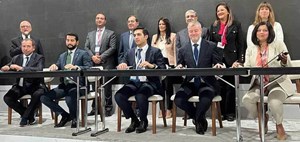News
The European Bank for Reconstruction and Development supports first green H2 facility in Egypt
The European Bank for Reconstruction and Development (EBRD) is supporting the decarbonization and Paris alignment of Egypt’s economy with a $80-MM loan to Egypt Green to develop the country’s first green H2 facility.
Egypt Green is owned, built and operated by Fertiglobe, one of the largest seaborne exporters of combined urea and ammonia, Scatec ASA, a Norway-based integrated independent power producer, Orascom Construction, one of the largest engineering and construction groups in the Middle East and North Africa, and the Sovereign Fund of Egypt, a state-owned, privately managed investment fund positioning itself as the partner of choice in Egypt.
The EBRD’s financing will be used to acquire and construct a 100 MW electrolyzer facility to be powered by renewable energy. When fully developed, the facility will deliver up to 15,000 tpy of green H2 annually. This, in turn, will be used as an input to produce green ammonia to be sold on the Egyptian and international markets.
Ammonia production is energy intensive and responsible for around 1.8% of global carbon dioxide (CO2) emissions despite its essential nature as the building block for nitrogen fertilizers, a critical crop input that provides food to 40% of the world’s population. Reducing the amount of CO2 produced during the manufacturing process is, therefore, key to helping the world achieve its net zero targets by 2050. Using green H2, produced by means of renewable energy, is seen as the critical step in getting there.
This landmark project is a first step towards the decarbonization of the ammonia sector in Egypt. It will serve as a benchmark for future green H2 projects and showcase that H2 and ammonia production can be decarbonized in Africa’s largest ammonia-producing country, where current production is natural gas based, generating significant carbon emissions.
At full capacity, the facility’s green H2 production will save more than 130,000 tpy of CO2 emissions.
“We are proud to support the first, truly innovative, green hydrogen facility in Egypt,” said Nandita Parshad, Sustainable Infrastructure Managing Director at the EBRD. “It will contribute to the decarbonization of Egypt’s carbon-intensive industries and will demonstrate Egypt’s commitment to a thriving low-carbon hydrogen sector. It also demonstrates the commercial viability of green hydrogen production, paving the way for the decarbonization of fertilizer and other hard-to-abate industries in our economies.”
Andrew Tait, Chief Financial Officer of Fertiglobe said, “We are pleased to have the support of the EBRD, which enables Fertiglobe and our partners to bring the first phase of this project to life. This also underpins our future efforts to scale up towards the 100 MW electrolyzer capacity, as we work on reaching the final investment decision for the next phase of the project.”
Reham ElBeltagy, CFO of Orascom Construction said, “Our partnership with the EBRD spans several sectors that have a direct positive impact on infrastructure and industrial development. This project paves the way for the creation of a hydrogen industry for the first time in Egypt. Such new projects require strong financial partners, and we are pleased to collaborate once again with the EBRD on this sustainable project.”
Karim Badr, CEO of the TSFE Infrastructure & Utilities Subfund said, “This loan is a testament from lenders to Egypt’s attractiveness as a green hydrogen hub. We are pleased to have received the first green hydrogen financing from the EBRD following our collaboration on the development of Egypt’s green hydrogen strategy.”
Mikkel Tørud, CFO of Scatec ASA said, “This is testimony to the long-term partnership Scatec has with the EBRD. We are pleased to have strong financial partners in this green hydrogen project in Egypt. We see a massive green hydrogen demand driven by strong policy support globally, and Africa is perfectly positioned to take advantage of its low-cost renewables and strategic position.”


